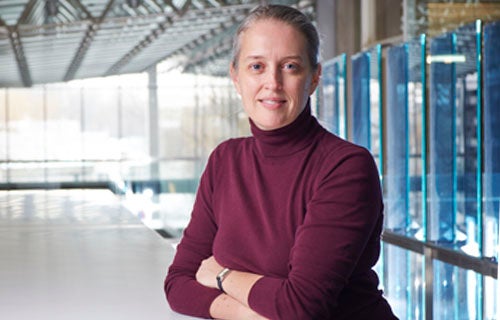
When should innovation take an ethical pause?
From researching deadly microbes to cracking computer codes - ethical dilemmas challenge scientists, says Waterloo professor

From researching deadly microbes to cracking computer codes - ethical dilemmas challenge scientists, says Waterloo professor
By Suzanne Bowness Marketing and Strategic CommunicationsIs a biologist experimenting with potentially deadly pathogens responsible for thinking about where those viruses might end up? Should a computer programmer worry about her code being hijacked and used maliciously by hackers?
 At what point, if any, should scientists enlist experts from the social sciences to help grapple with these moral dilemmas?
At what point, if any, should scientists enlist experts from the social sciences to help grapple with these moral dilemmas?
These are just some of the questions that University of Waterloo Philosophy Professor Heather Douglas will be discussing on a panel at the prestigious American Association for the Advancement of Science (AAAS) conference held in Chicago this week.
“There have been scientists who say, ‘I just develop the technology; how it gets used is up to society’,” says Douglas. “That view is under increasing conceptual and practical pressure, because we’re all part of a human society and we’re responsible for the implications of our work on society. Part of my work as a philosopher is to think through these issues in a clear and coherent way.”
Researchers delay publishing work on toxin
While clear guidelines exist for scientists who use human subjects in their research, at the moment there are no similar structures for evaluating the potential effects of innovation. Moreover, it’s less clear exactly when such quandaries should be evaluated. Do scientists take an ethical pause before they start work with a deadly virus? Before they publish the information?
These dilemmas are not just theoretical, says Douglas: A few years ago there were debates around H5N1 research and, more recently, researchers decided not to publish work on a “particularly nasty” form of botulism toxin until they found a way to counteract it.
These concerns also go beyond biosecurity to fields like nanotechnology and mathematics where researchers are working at the frontiers of encryption.
At the same time, Douglas and her colleagues have no desire to slow scientific innovation by instituting cumbersome structures on research.
Social impact: Who gets new technology first?
Beyond worst case scenarios, Douglas and her colleagues also focus on social impacts of innovation. If new technology tends to find its way to wealthier society first, is it possible to innovate in ways that allow the poorest in society to benefit more quickly?
Is it possible to anticipate the unexpected for technology better than we have in the past? While Ernest Rutherford’s research on radioactivity was a precursor to the atomic bomb, the early twentieth-century physicist died before fission was even discovered, much less exploited, says Douglas.
Today’s equivalent issues, says Douglas, are worth thinking about sooner rather than later.

Read more
Lesson 2.5: how jellyfish can change your perspective on R&D

Read more
Waterloo Philosophy Professor Heather Douglas has been named a Fellow of the American Association for the Advancement of Science (AAAS)

Read more
Waterloo partners in national campaign to raise the profile of Canadian research
The University of Waterloo acknowledges that much of our work takes place on the traditional territory of the Neutral, Anishinaabeg, and Haudenosaunee peoples. Our main campus is situated on the Haldimand Tract, the land granted to the Six Nations that includes six miles on each side of the Grand River. Our active work toward reconciliation takes place across our campuses through research, learning, teaching, and community building, and is co-ordinated within the Office of Indigenous Relations.